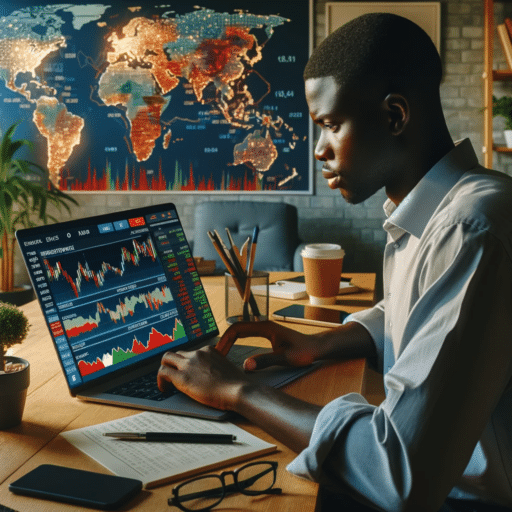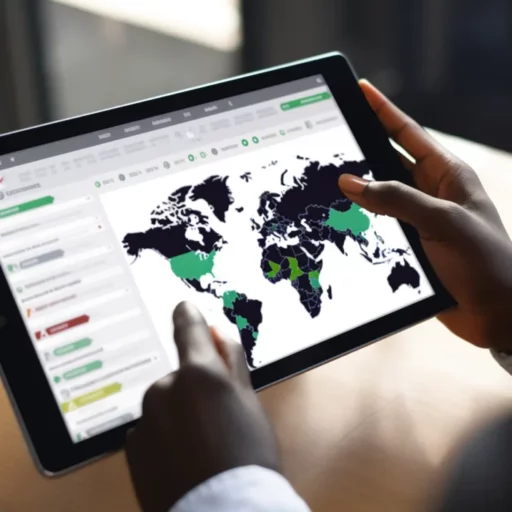For investors, looking to explore investments beyond borders, understanding the best strategies in 2023 is essential.
Investing internationally from Senegal offers a diverse range of opportunities and challenges. With a stable democracy and consistent economic growth, Senegal presents an open and inviting environment for foreign investment.
The Government of Senegal (GOS) actively encourages foreign direct investment (FDI), focusing on improving the business climate and making the country a strategic base for operations in Francophone Africa.
This has led to significant infrastructure improvements, economic reforms, and increased investment in strategic sectors, boosting private sector competitiveness.
However, challenges exist, including burdensome tax administration, complex customs procedures, bureaucratic hurdles, and an inefficient judicial system.
High real estate and energy costs, along with high costs of inputs for manufacturing, affect competitiveness. Moreover, high levels of unemployment and underemployment, especially among the youth, pose long-term macroeconomic challenges.
Diversifying investments globally is crucial for investors in Senegal, as it mitigates risks associated with local markets and provides exposure to a variety of economic sectors and geographical regions.
This approach balances the investment portfolio, reducing the impact of local market fluctuations and enhancing potential returns.
If you want to invest as an expat or high-net-worth individual, which is what i specialize in, you can email me (advice@adamfayed.com) or use WhatsApp (+44-7393-450-837).

Understanding the Basics of International Investing
Investing internationally from Senegal involves understanding various key terms and concepts. These include:
- Foreign Direct Investment (FDI): Investments made by a person or company based in one country into business interests located in another country. Senegal’s FDI stock stood at USD 8.7 billion by the end of 2020, reflecting the country’s attractiveness to foreign investors.
- Emerging Markets: Nations with social or business activities in the process of rapid growth and industrialization. These markets offer high growth potential but also come with higher risk.
- Portfolio Diversification: The practice of spreading investments across various financial instruments, industries, and other categories to reduce risk.
The Role of Currency Exchange Rates When Investing Internationally from Senegal
Currency exchange rates play a crucial role in international investing. The CFA franc, used in Senegal and other West African countries, is pegged to the Euro, providing stability in international transactions.
However, fluctuations in exchange rates can significantly impact the value of investments and returns.
Regulatory Environment for Senegalese Investors Abroad
Senegalese investors must navigate various regulatory environments when investing internationally.
This includes understanding the investment laws and regulations of the target country, international trade agreements, and compliance with both local and international financial reporting standards.
The GOS’s efforts to improve the business climate and its focus on digital transformations and infrastructure development are pivotal in creating a conducive environment for investors looking to expand globally from Senegal.
Assessing Your Investment Goals and Risk Tolerance
When engaging in investing internationally from Senegal, it’s crucial to distinguish between short-term and long-term investment strategies.
Short-term strategies typically focus on gaining profits within a few months to a year, often involving more volatile markets and higher risks.
This approach requires constant market monitoring and quick decision-making to capitalize on short-term market fluctuations.
In contrast, long-term investment strategies are designed for periods extending over several years. This method often involves investing in stable markets or assets that show potential for gradual growth, like blue-chip stocks, bonds, or international mutual funds.
For Senegalese investors, considering the country’s economic landscape is essential.
Senegal’s foreign direct investment (FDI) has shown significant growth, rising from $3.4 billion in 2015 to $6.4 billion in 2019, with a notable expansion in sectors like power generation, renewable energy, and offshore oil and gas.
The long-term strategy might involve investing in these growing sectors, focusing on stability and sustained growth.
However, short-term strategies might involve capitalizing on emerging trends.
For instance, the rise in Senegal’s FDI inflows, which increased by 21% from 2020 to 2021, and the 27% rise in announced greenfield projects indicate areas where quick, strategic investments could yield significant returns.
When investing internationally from Senegal, diversifying your portfolio to include both short-term and long-term assets can balance risk and reward.
Long-term investments provide stability and growth potential, while short-term investments allow for quicker gains and capitalize on immediate market trends.

Risk Assessment for Different International Markets
Risk assessment is an integral part of investing internationally in Senegal. Each international market comes with its own set of risks and opportunities.
For instance, developed markets like the U.S. or EU countries typically offer stability and well-regulated financial systems but might offer lower growth potential.
Emerging markets, on the other hand, can offer higher growth rates but come with increased political, economic, and currency risks.
For Senegalese investors, understanding the economic conditions of their target investment destinations is vital.
Senegal’s economy, projected to grow over 5.3% in 2023, partly due to its emerging oil and gas industry, makes it one of the strongest growing economies in sub-Saharan Africa.
This growth suggests potential for outbound investments from Senegal to other rapidly developing economies in similar sectors.
However, assessing risks like political stability, currency exchange rate fluctuations, and market volatility is crucial.
For instance, investing in tourism or real estate in regions recovering from economic downturns might offer high returns but come with considerable risks.
Senegal’s own tourism sector, which recovered with a growth rate of 3.2% in 2021 after a significant contraction in 2020, highlights how external factors like global pandemics can impact markets.
Selecting the Right Markets and Sectors
Emerging Markets vs Developed Markets
When investing internationally from Senegal, understanding the distinct characteristics of emerging and developed markets is crucial.
Emerging markets, often characterized by rapid economic growth and industrialization, present unique opportunities and challenges. In 2023, investors are closely watching several key trends in these markets.
- High Rates, Low Growth: Emerging markets are expected to benefit from a slowing pace of interest rate hikes in major economies, potentially leading to a recovery with a softer dollar and falling inflation. However, recession fears in the United States and Europe cast a shadow over global markets, especially in the first half of the year.
- China’s Reopening: China’s economy, making up nearly a fifth of global GDP, is expected to experience a sharp upswing from mid-2023. This could provide a significant economic tailwind, especially given the high savings rate in China.
- War in Ukraine: The conflict has significantly impacted emerging markets, transforming energy markets, inflation pressures, food security, and geopolitical risks. Emerging Europe has felt the immediate humanitarian impact, including refugee movements and Russia’s brain drain.
- Debt Reworks: Countries like Zambia, Ethiopia, Sri Lanka, and Ghana are overhauling debt burdens, with China emerging as a top bilateral lender. This complex mix of creditors makes debt resolution slow and challenging.
- Brazil and Turkey’s Political Dynamics: In Brazil, markets are looking for fiscal controls under President Luiz Inacio Lula da Silva. In Turkey, upcoming elections could lead to significant political and economic shifts, given the country’s surging living costs and currency challenges.
In contrast, developed markets, typically characterized by more stable economies and advanced infrastructures, are navigating different trends in 2023:
- US Economic Resilience: The US economy is performing better than expected, with consumer spending remaining resilient. However, growth is expected to slow by early next year.
- Inflation and Monetary Policy: Inflation is gradually improving in developed markets, with the US Federal Reserve nearing the end of its hiking cycle. This shift in monetary policy is significant for global liquidity.
- Labor Market Dynamics: Developed markets are experiencing a cooling in labor market conditions, which could lead to higher unemployment rates in the coming years.
- Consumer Spending Shifts: In the US, the tailwind from pandemic-era savings is fading, with a shift towards service-oriented spending.
- Supply Chain Improvement: Supply chain bottlenecks have largely been resolved, positively impacting various sectors.
- Housing Market Stabilization: The housing market is stabilizing, which could influence investment opportunities in real estate and related sectors.
- Debt and Economic Policy: The resolution of the US debt ceiling crisis with minimal economic impacts and changes in government borrowing and spending policies will influence economic growth.
Sector Analysis for International Investments
Investing internationally from Senegal requires a keen understanding of sector-specific trends and opportunities. Here are key sectors to consider in 2023:
Technology
Technology remains a dynamic sector with continual innovation. Investors should focus on companies leading in areas like artificial intelligence, cloud computing, and cybersecurity. The integration of technology in various industries also presents cross-sector investment opportunities.
Healthcare
The healthcare sector is experiencing growth, driven by aging populations in developed countries and increasing healthcare access in emerging markets. Biotechnology, pharmaceuticals, and healthcare technology are sub-sectors that offer diverse investment opportunities.
Renewable Energy
Renewable energy is a rapidly growing sector, fueled by global efforts to combat climate change. Investments in solar, wind, and other renewable energy sources, as well as in technologies that support energy efficiency, are becoming increasingly attractive.
Legal and Tax Implications
Investing internationally from Senegal involves a thorough understanding of the international tax laws that impact Senegalese investors.
When engaging in such investments, it’s crucial to comprehend how different countries’ tax systems interact with Senegalese tax laws and the implications on your investments.
Key Considerations:
- Double Taxation Treaties (DTTs): Senegal has entered into DTTs with several countries. These treaties are vital in preventing double taxation of income earned abroad. They also outline the process for enforcing foreign tax credits either in Senegal or abroad, based on the direction of payments. However, in practice, enforcing foreign tax credits in Senegal is quite rare.
- Impact on Different Types of Income: Different types of income, such as dividends, interest, and royalties, can be taxed differently under international tax laws. Knowing the specific tax implications for each type of income is crucial for efficient tax planning.
- Tax Liabilities for Different Investment Vehicles: Depending on the nature of the investment, different tax rules may apply. For example, direct investments in real estate or businesses may have different tax implications compared to investments in stocks or bonds.
- Tax Compliance and Reporting Requirements: Investors must adhere to both Senegalese and international tax compliance and reporting requirements. This includes declaring foreign income and understanding the tax obligations in the country where the investment is made.
Investing internationally from Senegal necessitates a strong grasp of these elements to ensure compliance and optimize tax efficiency.

Legal Considerations for Senegalese Investors
Legal considerations are pivotal when investing internationally from Senegal. Investors must navigate a myriad of laws and regulations, both in Senegal and in the countries where they choose to invest.
Key Legal Frameworks:
- Bilateral Investment Treaties (BITs): These treaties between Senegal and other countries provide a legal framework for investment protection and promotion. They cover aspects like investment rights, expropriation, and compensation in the event of nationalization or similar government actions.
- Treaties with Investment Provisions (TIPs): These are broader economic treaties with investment-related provisions, and they can vary significantly in scope and content. Understanding these treaties is vital for Senegalese investors as they navigate international investment landscapes.
- Investment-Related Instruments (IRIs): These include various binding and non-binding instruments that can influence international investment decisions. Examples include model agreements, arbitration rules, and documents adopted by international organizations.
Investing internationally from Senegal requires careful consideration of these legal frameworks to ensure that investments are legally sound and protected.
Seeking Legal and Tax Advice
Given the complexity of international investing from Senegal, seeking professional legal and tax advice is essential. This step ensures compliance with all relevant laws and regulations and optimizes the financial outcomes of investments.
Why Professional Advice is Crucial:
- Customized Tax Strategies: Professionals can help design tax strategies that align with individual investment goals and risk tolerance, considering the specific tax laws of the countries involved.
- Legal Compliance: Advisors can ensure that investments comply with both Senegalese and international legal requirements, reducing the risk of legal complications.
- Understanding Tax Mitigation Strategies: Different strategies, such as avoiding the classification as a permanent establishment or using intellectual property rights in cross-border transactions, can have significant tax implications. Advisors can guide investors through these strategies and help them understand their benefits and limitations.
- Adapting to Changing Laws and Treaties: International tax laws and investment treaties can change. Professional advisors keep up-to-date with these changes, ensuring that investment strategies remain effective and compliant.

Balancing Your Investment Portfolio
Investing internationally from Senegal opens up a multitude of opportunities for diversification, which is a critical component in balancing an investment portfolio.
Diversification in a global portfolio involves spreading investments across various countries, regions, and asset classes, such as stocks, bonds, and commodities.
This strategy not only reduces risk but also potentially enhances returns by mitigating the impact of negative events in any single country.
When investing internationally from Senegal, it’s crucial to understand that diversification goes beyond just geographic spread. It includes a mix of different asset classes and sectors, each with its own risk and return characteristics.
For instance, stocks generally offer higher growth potential but come with greater volatility, while bonds provide more stable income with lower growth prospects.
A well-diversified global portfolio also includes investments in both developed and emerging markets.
Developed markets, like the United States or Europe, offer stability and mature investment opportunities.
Emerging markets, on the other hand, while riskier, can offer higher growth potential due to their rapid economic development.
Investing internationally from Senegal also involves considering currency diversification. Currency exchange rates can significantly impact investment returns.
By investing in different countries, investors can hedge against currency risk and potentially benefit from favorable exchange rate movements.
Regular portfolio review and rebalancing are essential when investing internationally from Senegal. Market conditions change, and the relative performance of various countries and asset classes can shift.
Regularly adjusting the portfolio helps maintain the desired level of diversification and alignment with investment goals.
Geographic and Sector Diversification
Geographic and sector diversification are two fundamental aspects of investing internationally from Senegal.
By spreading investments across different geographic locations and industries, investors can mitigate risks and enhance potential returns. This strategy ensures that the performance of any single country or industry does not have a disproportionate impact on the overall portfolio.
Investing in a mix of industries, like technology, healthcare, and renewable energy, offers several benefits. Each industry has its own growth dynamics, risks, and opportunities.
For example, the technology sector is known for its innovation and high growth potential, whereas the healthcare sector offers stability and consistent demand.
The renewable energy sector is increasingly relevant due to the global shift towards sustainable energy sources.

Sector diversification helps in managing investment risks associated with market timing. Predicting which sector will perform well at any given time is challenging.
By diversifying across various sectors, investors can benefit from the overall market growth, regardless of individual sector performance.
Investing internationally from Senegal also involves managing risks specific to industries.
For example, a technological disruption can significantly impact the tech industry, but it may not affect the healthcare sector to the same extent. Thus, diversification across sectors can protect against such industry-specific risks.
Moreover, sector diversification provides opportunities for growth by allowing investors to capitalize on the strengths of different sectors at different times.
For instance, during a technological boom, the tech sector may offer higher returns, while during a healthcare crisis, the healthcare sector might become more lucrative.
Pained by financial indecision?

Adam is an internationally recognised author on financial matters with over 830million answer views on Quora, a widely sold book on Amazon, and a contributor on Forbes.



